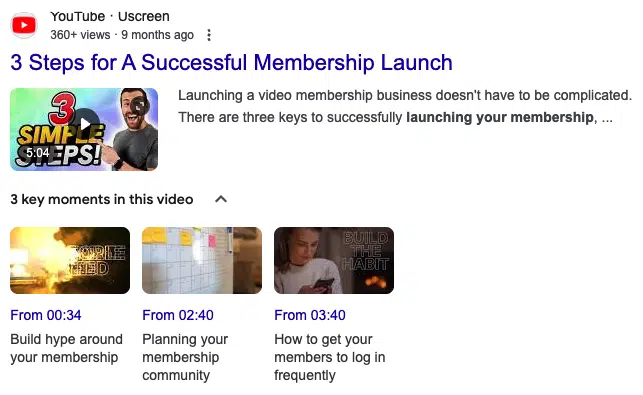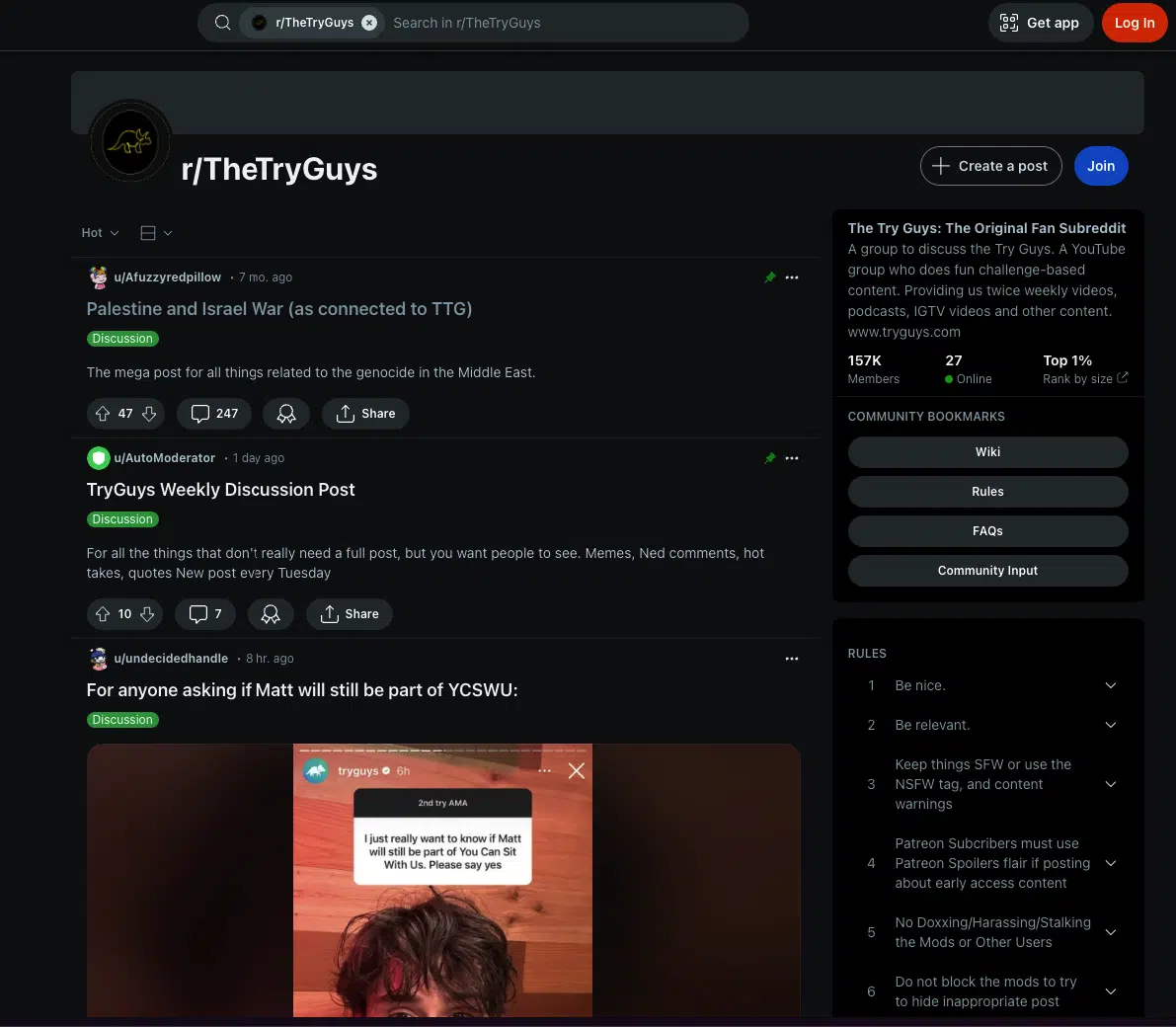Driving traffic to gated content and paywalled sites: SEO tips + examples

We know that gated content can drive leads and revenue. However, hiding your best stuff can be a double-edged sword.
On the one hand, it creates exclusivity and value for paying subscribers; on the other, it presents a challenge in driving organic traffic.
For video membership sites, where much of the valuable content is locked behind a paywall, striking a balance between content accessibility and exclusivity is key.
This article explores strategies to optimize such sites and boost traffic without compromising the premium nature of gated content.
The challenge of gated content
Gated content, especially video content, is a powerful tool for generating revenue and maintaining an engaged community. However, it limits the content available for search engine indexing, potentially reducing organic traffic.
For video membership sites, for example, or other subscription-based sites, optimizing for search engines while maintaining the gated content’s allure is a nuanced task.
Understanding the balance between providing enough free content to attract visitors and maintaining the value of gated content is crucial for success.
The SEO implications of gated content
Search engines thrive on content accessibility. When significant portions of a site are behind a paywall, search engines can’t index them.
Gated or paywalled content often contains rich, valuable keywords that do not contribute to the site’s overall organic visibility.
What search engines can’t access or read, they cannot rank. It’s a problem that has many subscription site owners scratching their heads.
They want their site to be found to attract new members/subscribers, but they don’t want to give away content (making it freely crawlable and visible to users) that people should be paying for.
How do I stop Google from indexing my gated content?
Your big-money content will likely be hidden behind a number of walls (gates, locks, take your pick), some of them more successful at preventing crawling and indexing than others.
How thorough they are and whether the work is done for you will depend on your platform/CMS. Here are some simple examples.
Noindex, nofollow
You would find noindex and nofollow tags in the HTML <head> section of a webpage. These tags are added to the page’s HTML code to control how search engines interact with that specific page.
The noindex tag tells search engines not to include a specific page in their search results. The nofollow tag instructs search engines not to follow any links on a page, so the linked pages don’t benefit from the link.
These tags help control what gets indexed and how link value is passed (or isn’t passed as the case may be).
Robots.txt
A robots.txt file is a simple text file in your website’s directory that tells search engines which pages they can and cannot crawl. Its main purposes are to manage search engine traffic, reduce server load and prevent indexing of private or non-essential content.
By specifying these rules, you can ensure that search engines focus on the most important parts of your site, improving its visibility and performance in search results. If your robots.txt is set to stop Google’s crawler/bot from the site, it’ll look like this.
User-agent: Googlebot
Disallow: /
If it’s set to exclude only certain pages or content from crawling, it might look more like this.
User-agent: Googlebot
Disallow: /vide-catalog/
Disallow: /course-content/
Go to your website and then type /robots.txt at the end of the URL to see your robots.txt file. Always get professional guidance before changing your robots.txt file.
Note: If a robots.txt file blocks the page or if the crawler is otherwise unable to access it, the crawler won’t be able to detect the noindex directive. Under these circumstances, the page might still appear in search results despite the directive – especially if other pages link to it.
X-robots tag
A simple command that can be included in the settings of your website to tell search engines what they should not show in search results.
This is particularly useful for content like PDF files or images that can’t use regular website commands because they don’t contain standard website code.
To keep search engines from showing certain files in search results, you can set the X-Robots-Tag to noindex.
This tells search engines to skip over these files when they’re putting together search listings, which is perfect for content you only want certain people to see, like subscribers or registered users.
Does SEO apply to gated content?
If you’re hiding content from search engines, it cannot rank or help your other content to rank. It’s an uncomfortable truth that makes questions about SEO and membership sites, for example, difficult.
Instead, a better question to ask yourself and your marketing team is, “How can I use SEO principles to market my premium, paywalled content?”
While the challenges of gated content are real, there are strategic approaches that can help attract traffic to your site and through your conversion funnel.
Top strategies balancing SEO and gated content
It is possible to find a balance between openly publishing content that brings eyeballs and $$$, without giving away your best stuff. Here are some suggestions to get you started.
1. Creating high-quality teaser content
Teaser content serves as a preview of the gated content. It should be valuable enough to rank in search engines and entice visitors to subscribe.
Short snippets or trailers can effectively showcase what’s behind the paywall. These clips should highlight key points or particularly engaging moments to pique viewers’ interest.
For instance, a 30-second clip featuring highlights from a longer tutorial can showcase the value of the full content.
Recently, educational YouTuber Astrum combined a face reveal video with a tease of his new Patreon membership community. Since publishing the video, his Patreon members have grown to four figures.

2. Leveraging ungated content
When it comes to boosting your site’s visibility and subscriber count, ungated content is your best friend. It’s all about drawing in a broad audience and gently guiding them towards more exclusive, gated materials.
Landing pages
Strategically crafting blog posts and dedicated landing pages can significantly boost the visibility of your gated content and drive conversions.
By optimizing these assets with targeted keywords, engaging content and clear calls to action, you can attract both search engine traffic and motivated leads eager to access your premium content offerings.
Prolific blogger and social media course creator Anita Dysktra has a brilliant landing page for her Passive Profit with Pinterest course.
It’s a beast of a page, featuring animated elements, strong CTAs, plenty of detail about what the course entails (she uses her expert writing skills to really sell the dream of what completing the course can mean for each student) and social proof in the form of case studies.

Blog posts and topic clusters
Now, onto blogs and topic clusters: This is where your content really starts to work smarter.
By creating high-quality blog posts that speak directly to your target audience, organizing them around core topics and signposting your gated content/catalog from your free content, you build a solid network that spiders out from a central “pillar” page.
This setup is great for SEO and provides a more intuitive user journey.
- Start by pinpointing key themes that resonate with your audience.
- Create a central pillar page for each theme and branch out to several accessible, free articles.
- These pieces pull in organic traffic with valuable, easy-to-access information.
- Then, weave in links to more exclusive, gated content that delves deeper into the subject. This approach boosts your pages in search rankings and naturally leads curious readers toward becoming subscribers.
By crafting these topic clusters, you enhance search performance while guiding your visitors through a curated content journey that feels both organic and enlightening.
This method ensures they consistently find valuable content at every turn, solidifying your brand as a trusted authority and naturally encouraging them to explore your gated materials.
Get the daily newsletter search marketers rely on.
3. Implementing SEO best practices for videos
For the videos you do share publicly, video SEO is critical. Implementing best practices ensures that your videos contribute to your site’s overall SEO health.
Optimize video titles and descriptions
This one is kind of obvious but still gets forgotten. When it comes to video content, the titles and descriptions play a crucial role in attracting viewers and enhancing the video’s SEO.
Start by naturally integrating relevant keywords into your video titles to boost discoverability. Aim for catchy and descriptive titles that succinctly convey the essence of the video while enticing potential viewers to click.
For the descriptions, go beyond a simple summary. Provide a detailed overview that includes the primary keywords related to the video’s content.
This aids search optimization and helps viewers understand what to expect from the video, improving engagement rates. Additionally, include calls to action and links to related content or your website to drive further interaction and traffic.
Enhance your videos with subtitles
Adding subtitles is not just about making your videos more accessible – it’s also a smart SEO move.
Subtitles open up your content to a wider audience, including those who are deaf or hard of hearing and viewers who might be scrolling through their phones in places where audio isn’t an option. Plus, let’s not forget the viewers who simply prefer reading along!
Subtitles can also boost your SEO. By embedding subtitles, you’re effectively feeding search engines with a rich layer of text full of relevant keywords from your video.
It can then be pulled into the structured data of the video (see the next section for more information). This makes your content more crawlable and indexable, enhancing your visibility in search results.
And there’s more – subtitles can lead to better engagement. Videos with subtitles often keep viewers hooked longer. Why?
Whether your content is packed with jargon or you’re explaining complex concepts, subtitles can help viewers follow along and grasp the details.
To get subtitles up, either update or fix YouTube’s often janky auto-subtitles. You can also create SRT files which are simple text files that sync your video dialogue with the timing of each text segment. Upload these with your videos, and voilà, your content will be more inclusive and primed for better search engine performance.
Use structured data
Implementing schema markup for your videos is another powerful way to enhance their visibility in search results. By adding structured data, you provide search engines with a more explicit understanding of your video content.
Structured data can include the video title, description, duration and more. If your video is hosted on YouTube, any embed will come with structured data built-in, but a lot of the SEO value and traffic will go to the YouTube page, not your website.
An alternative option could be hosting somewhere like Wistia. Your video would have built-in structured data, but the Wistia video page isn’t indexed, so all the SEO value goes to your site.
Structured data helps to create rich snippets, which are enhanced descriptions that appear in search results.
These snippets can significantly increase click-through rates by offering potential viewers detailed information about the video content directly in the search results, such as a thumbnail and a brief description.
This extra context can make your video more appealing and informative at a glance, which encourages more clicks and, ultimately, more views.

It’s important to note that on Google, the game is very much rigged toward YouTube (which makes sense, as Google owns YouTube).
Most video snippets in search are from YouTube, and there are now tighter guidelines on how pages can be eligible.
Dig deeper: A technical guide to video SEO
4. Freebies and giveaways
Offering a mix of free and premium content can be a game-changer for drawing in a diverse audience and nurturing them toward becoming paying subscribers.
Start by identifying what you can give away. This could be a few starter lessons from a course or some introductory articles that showcase the breadth and quality of your content. These freebies are your hook – they grab attention and spark interest.
Think of your free content as a teaser, a sample platter with just enough taste to leave your audience craving more.
For instance, if you’re offering a course’s first few lessons for free, ensure these are engaging and informative. They should deliver value and clearly demonstrate what users gain by opting into the full course.
As users enjoy the free content, they should encounter natural cues nudging them toward the gated, premium offerings. It’s about making the transition feel like a natural next step.
Highlight what’s beyond the paywall: deeper insights, more comprehensive data, exclusive resources – these are your main selling points.
And why not throw in a special giveaway now and then?
Maybe it’s one-time free access to a detailed guide or a private webinar. These limited-time perks can provide a compelling reason for free users to upgrade to the premium side.
Creator Latasha James has built an extensive content catalog for those looking to step into or advance a freelancer career.
Her free Launch Your Freelance Career course is promoted on her socials and “main” site, which acts as a funnel into her membership platform. It’s an excellent example of giving away quality content in return for engagement with future members.

5. Utilizing user-generated content
Users who advocate and create content for/with you are gold! Their authentic engagement and contributions can be incredibly valuable to your business and online presence.
Encouraging users to actively participate in creating and sharing content can boost engagement and positively impact your site’s SEO.
User-generated content (UGC), whether in the form of reviews, testimonials or community forums, adds a personal touch that resonates with your audience.
Here are some ways you can utilize UGC for SEO benefits.
Encourage reviews and testimonials
Positive reviews and testimonials boost your brand’s credibility and can be a secret ****** for enhancing your search visibility, especially if you play your cards right.
First things first: figure out where your audience likes to hang out. This will guide you on how to best leverage testimonials.
If your audience spends much time on YouTube, why not showcase engaging video testimonials there?
A written review is one thing, but to have a member or subscriber take time out of their schedule to sit and record a testimonial with you is something else.
For audiences who inhabit a lot of space on social media, think about creating snappy shorts or reels.
These bite-sized testimonials can capture attention quickly, making them perfect for sharing on TikTok, Instagram or Facebook.
If your blog is where the action is, turn those video testimonials into rich blog posts.
- Start by transcribing the video to capture the spoken words in text form, boosting your SEO by making the content searchable.
- Then, embed the video to engage those who prefer watching over reading.
This dual approach diversifies your blog’s content and deepens each post’s impact.
Don’t forget to also encourage your happy customers to leave reviews on prominent review sites and within online communities.
These independent reviews reinforce the quality and value of your content, further boosting your credibility and, indirectly, organic search rankings.
Nurture your community: Make space for them
Setting up forums or discussion spaces where users can swap stories and insights is just the beginning. The real magic happens when you jump into the mix.
It’s essential for you to get down in the trenches, talking directly to your members and engaging with them wherever they hang out online.
When folks feel heard and valued, they’re more likely to engage deeply and spread the word, boosting both community spirit and your content’s reach.
Let’s look at The Try Guys as a prime example. Their subreddit isn’t just a place to chat – it’s a thriving community hub. Here, fans dissect episodes, share memes and connect over shared interests.

But it’s not just about keeping fans happy. Active communities generate a ton of user-generated content ripe for search engine indexing, which can really ramp up your SEO efforts.
Plus, these forums are gold mines of insights into what your audience loves, which can steer your future content and marketing strategies.
Also, personally diving into community discussions does wonders for humanizing your brand. It transforms you from a distant broadcaster to a relatable figure who genuinely cares about what’s buzzing in the community.
This can build a solid base of trust and loyalty, making members feel connected to your brand on a personal level.
6. Promoting gated content through social media, email and influencers
While SEO plays a fundamental role in driving traffic, it’s essential not to overlook the power of other channels.
Social media, email marketing and influencer partnerships are invaluable tools for reaching wider audiences and directing more traffic to your gated content.
Tease content on social media
Using social media to promote your gated content can dramatically boost both its reach and engagement.
Start the conversation by sharing intriguing snippets, standout quotes and compelling highlights from your content. This approach doesn’t just spark curiosity among your followers; it gives them a sneak peek of the valuable stuff waiting behind the gate.
Why not add some eye-catching visuals to the mix? Think custom graphics, short video clips or even animated GIFs to make your posts pop in a busy social media feed.
It’s also vital to nail your captions – they should highlight what makes your content unique and include a persuasive call to action that encourages clicks.
Take a page from The Try Guys’ playbook: on Instagram, they use snippets and behind-the-scenes glimpses to draw followers to their subscription streaming platform, 2nd Try.
By showcasing the entertaining and engaging nature of their exclusive content, they not only attract views but also boost the perceived value of their offerings.
By consistently teasing content across your social channels, you create multiple opportunities to engage potential paid members, significantly boosting the chances they’ll sign up or subscribe for the full experience.
This approach drives traffic and generates anticipation and interest, key ingredients in converting followers into loyal customers or subscribers.
Email campaigns
Leverage the power of email marketing to spotlight your newest gated content and inspire more subscriptions. Integrating tantalizing previews of upcoming gated materials in your email communications can ignite interest and motivate your audience to subscribe for full access.
Begin by smartly segmenting your email list. This allows you to craft targeted messages that resonate deeply with distinct groups.
For instance, you can engage current subscribers by showcasing advanced content that complements and expands on their existing benefits, ultimately enhancing retention.
On the other hand, potential new leads might receive introductory emails highlighting the advantages of subscribing, perhaps coupled with an exclusive offer or an impactful case study showcasing the value of your content.
Consider employing dynamic content in your emails, which adjusts based on the recipient’s previous interactions with your site. This might include sections of gated content tailored to their demonstrated interests or past behaviors.
Dance fitness and education creators Bfunk cleverly used email to update their community about recent in-person events and encourage them to explore the classes and routines from those events online.

Engage with influencers
Influencers are trusted within their circles, making them perfect for reaching audiences that might not even know you exist.
Start by finding influencers or partners who really get your brand and have a following that matches your target audience. Their thumbs-up can significantly lift your content’s appeal.
Work together to create engaging content, like guest posts or exclusive previews, that showcases the real value of what you’re offering.
Why not kick things up a notch?
Engage your audience with something interactive, like a joint livestream or webinar. These real-time interactions are not just fun; they connect people directly to your brand, making it more likely they’ll hit that subscribe button.
Using influencers strategically can widen your reach, enhance your credibility and drive subscriptions, all while keeping the conversation lively and relevant.
Go get more traffic to your gated content
Navigating the complexities of a website with gated content can be quite an endeavor, but it’s definitely within reach.
By adopting the strategies we’ve delved into, video membership sites – and indeed any content-driven site – can find the perfect balance. This involves offering irresistible exclusive content while still pulling in organic traffic.
Through smart moves like teasing content snippets on social media, sending out finely tuned email blasts and partnering with influencers who resonate with your brand, you can significantly boost your site’s visibility.
But remember, this isn’t just about getting eyeballs on your pages; it’s about converting visitors into loyal community members.
By thoughtfully managing your gated content, you ensure it remains valuable and exclusive, making your subscribers feel part of something special. This sense of exclusivity keeps your current members happy and attracts new subscribers who are eager to dive into what you offer.
The end game? To foster a vibrant, engaged community that values your content and actively contributes to its expansion.
By weaving together SEO savvy with a keen understanding of your audience’s needs, your site is set not just to succeed but to thrive, building a dynamic community that grows and evolves with you.
Contributing authors are invited to create content for Search Engine Land and are chosen for their expertise and contribution to the search community. Our contributors work under the oversight of the editorial staff and contributions are checked for quality and relevance to our readers. The opinions they express are their own.
Source link : Searchengineland.com



